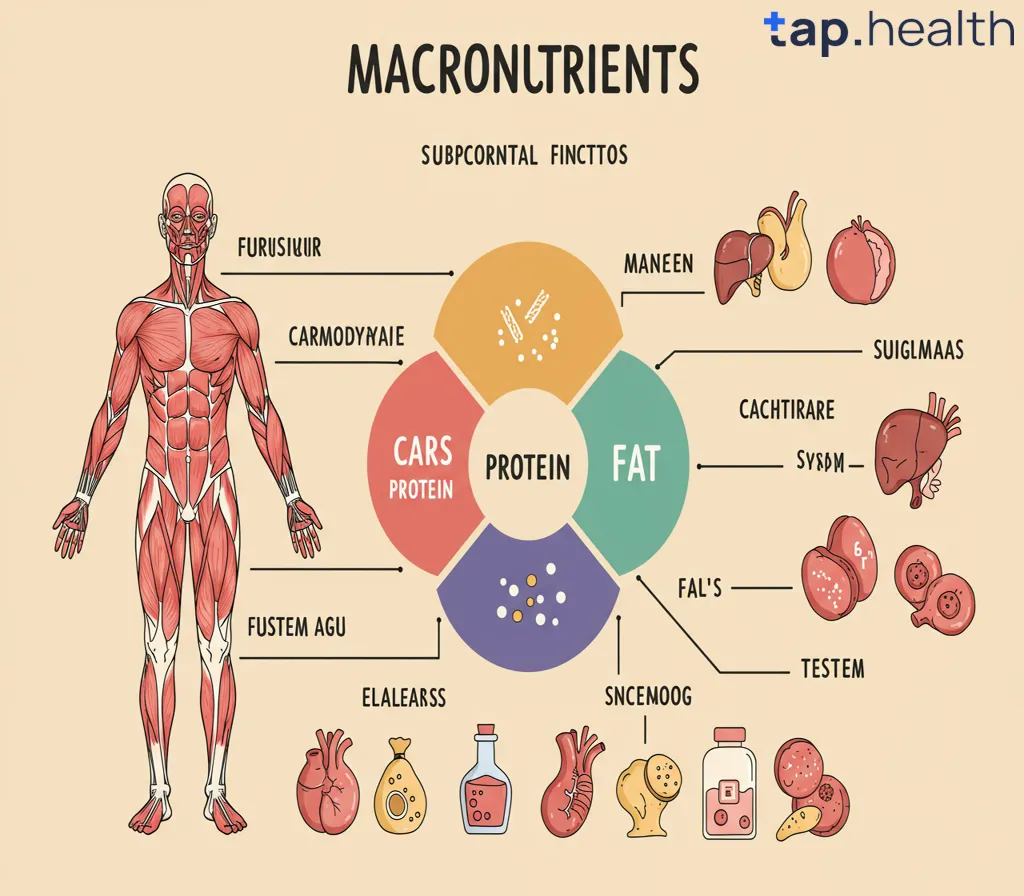If you’re starting your health or fitness journey, you’ve probably heard the term “macronutrients.” But what exactly are they? And why are they so important to your overall health and fitness goals? Understanding macronutrients is crucial to making healthier food choices, achieving fitness goals, and improving your overall nutrition.
In this guide, we’ll walk you through everything you need to know about macronutrients—what they are, the different types, and how to balance them in your diet for better health. Whether you’re trying to lose weight, gain muscle, or simply eat healthier, this guide will give you a solid foundation to build upon.
What Are Macronutrients?
1. The Basics of Macronutrients
Macronutrients are the nutrients your body needs in large amounts to function properly. They provide the energy (calories) required for all bodily functions and activities, from walking to thinking. The three primary types of macronutrients are:
- Proteins
- Carbohydrates
- Fats
Each of these macronutrients plays a vital role in your health, and understanding how to balance them is key to achieving your nutrition and fitness goals.
The Three Types of Macronutrients
Let’s take a closer look at each type of macronutrient and its role in your diet.
1. Proteins: Building Blocks of the Body
Protein is one of the most important macronutrients. It is responsible for building and repairing tissues, including muscles, skin, and hair. Protein also helps produce enzymes, hormones, and other body chemicals. This is why protein is crucial for anyone looking to build muscle, lose weight, or maintain healthy body functions.
Protein and Its Functions:
- Muscle Growth and Repair: After a workout, your muscles need protein to recover and grow.
- Immune System Support: Proteins are essential for the proper functioning of your immune system.
- Enzyme and Hormone Production: Protein helps produce enzymes and hormones that regulate various body processes.
How Much Protein Do You Need?
The amount of protein you need depends on various factors such as age, weight, and activity level. A general guideline is:
- For general health: 0.8 grams of protein per kilogram of body weight.
- For muscle building: 1.2–2.0 grams of protein per kilogram of body weight.
Good Sources of Protein:
- Meat (chicken, beef, turkey)
- Fish and seafood
- Eggs
- Dairy (milk, yogurt, cheese)
- Legumes (lentils, beans)
- Tofu and tempeh (for vegetarians)
2. Carbohydrates: The Body’s Primary Energy Source
Carbohydrates are the body’s preferred source of energy. When you eat carbs, your body breaks them down into glucose (a type of sugar) which is used for energy. Carbs are especially important for athletes or anyone engaging in intense physical activity, as they provide the quick energy required for performance.
Carbs and Their Functions:
- Energy Production: Carbs are your body’s most efficient source of energy.
- Brain Function: Your brain needs glucose from carbs to function properly.
- Muscle Recovery: Carbs help replenish glycogen stores in muscles after exercise.
How Much Carbohydrate Should You Consume?
The recommended daily intake of carbs depends on your activity level and goals. A general guideline is:
- For sedentary adults: 45-65% of your total daily calories should come from carbohydrates.
- For athletes: Carbs should make up 60-70% of your daily calorie intake.
Good Sources of Carbohydrates:
- Whole grains (brown rice, oats, quinoa)
- Fruits (apples, bananas, berries)
- Vegetables (sweet potatoes, carrots, broccoli)
- Legumes (beans, lentils)
- Whole-wheat bread and pasta
3. Fats: Essential for Health and Hormones
Fats often get a bad reputation, but they are vital for your body. Healthy fats support many functions, such as brain health, hormone production, and cell structure. Fats are also necessary for absorbing fat-soluble vitamins (A, D, E, and K).
Fats and Their Functions:
- Energy Storage: Fats are a long-term energy source and are stored in the body for later use.
- Hormone Production: Fats help produce essential hormones, including sex hormones.
- Brain Health: Healthy fats are crucial for proper brain function and memory.
How Much Fat Should You Eat?
Like carbs, fats should make up a certain percentage of your daily calorie intake. A general guideline is:
- For general health: 20-35% of your total daily calories should come from fat.
- For weight loss: Aim for the lower end of the range, around 20-25% of your daily calories.
Good Sources of Fats:
- Avocados
- Olive oil and coconut oil
- Nuts and seeds (almonds, walnuts, chia seeds)
- Fatty fish (salmon, mackerel)
- Nut butters (peanut butter, almond butter)
How to Balance Your Macronutrients
Understanding how to balance your macronutrients is key to maintaining a healthy diet. Here’s how you can figure out the right balance for your lifestyle and goals.
1. Determine Your Caloric Needs
The first step in balancing macronutrients is understanding your total calorie needs. You can calculate your Total Daily Energy Expenditure (TDEE) by determining your Basal Metabolic Rate (BMR) and factoring in your activity level. Once you know how many calories you need, you can break them down into the appropriate percentages of protein, carbs, and fats.
2. Adjust Your Macronutrient Ratios Based on Goals
The balance of macronutrients can change depending on whether you’re trying to lose weight, build muscle, or maintain your current weight. Here are some common macronutrient ratios:
- For weight loss: A typical ratio might be 40% protein, 30% fat, and 30% carbs.
- For muscle gain: Aim for 30% protein, 40% carbs, and 30% fats.
- For maintenance: A balanced ratio like 30% protein, 40% carbs, and 30% fats works well.
3. Track Your Macronutrients
To ensure you’re hitting your macronutrient goals, consider using a food tracking app like MyFitnessPal. These apps allow you to log your meals and monitor how many grams of protein, carbs, and fats you’re consuming each day.
Tips for Understanding and Managing Macronutrients
1. Start by Educating Yourself on Food Labels
Reading food labels is an excellent way to understand the macronutrient content of packaged foods. Look for the serving size, calories per serving, and the breakdown of protein, carbohydrates, and fats. Also, watch out for added sugars and unhealthy fats (like trans fats), which should be limited.
2. Eat Whole Foods Whenever Possible
Whole foods like fruits, vegetables, lean meats, and whole grains are nutrient-dense and provide the best sources of macronutrients. Avoid processed foods that are often high in unhealthy fats and added sugars.
3. Meal Prep to Control Macronutrients
If you want to ensure you’re hitting your macronutrient goals, meal prepping can be a helpful tool. Prepare your meals in advance and use a food scale to measure portions accurately, making it easier to track your macronutrients.
4. Be Flexible with Your Macronutrient Intake
While it’s important to stick to your macronutrient goals, it’s also important to remain flexible. Sometimes you might have to adjust your ratio depending on your physical activity, hunger levels, or specific health needs. The key is finding a balance that works for your lifestyle.
Frequently Asked Questions (FAQs) on The Ultimate Guide to Understanding Macronutrients for Beginners
What Happens If I Eat Too Much Protein?
Consuming too much protein won’t cause harm in most cases, but it can lead to digestive discomfort, kidney strain (in those with pre-existing kidney conditions), and potentially contribute to excess calorie intake. Balance your protein intake with healthy carbs and fats.
Can I Lose Weight While Eating More Carbs?
Yes, you can lose weight while eating carbs, as long as you are in a calorie deficit (burning more calories than you consume). Choose healthy, complex carbs like whole grains, fruits, and vegetables to support weight loss and provide lasting energy.
Do I Need Supplements to Meet My Macronutrient Goals?
Supplements are not necessary for most people if they are eating a balanced, nutrient-dense diet. However, if you struggle to meet your protein needs or have specific dietary restrictions, you might consider supplements like protein powder or omega-3 fish oil.
Can Macronutrients Help Build Muscle?
Yes! Adequate protein is essential for muscle growth and repair, and consuming enough carbohydrates provides the energy needed for intense workouts. Healthy fats support hormone production, which is also crucial for muscle growth. Balancing these macronutrients is key to achieving muscle-building goals.
In conclusion, understanding macronutrients is crucial for anyone looking to improve their diet and health. By understanding the roles of proteins, carbs, and fats in your body and learning how to balance them properly, you can create a diet that supports your personal goals, whether that’s weight loss, muscle gain, or overall health. Keep experimenting with different macronutrient ratios, track your intake, and make adjustments as needed to find what works best for you.



